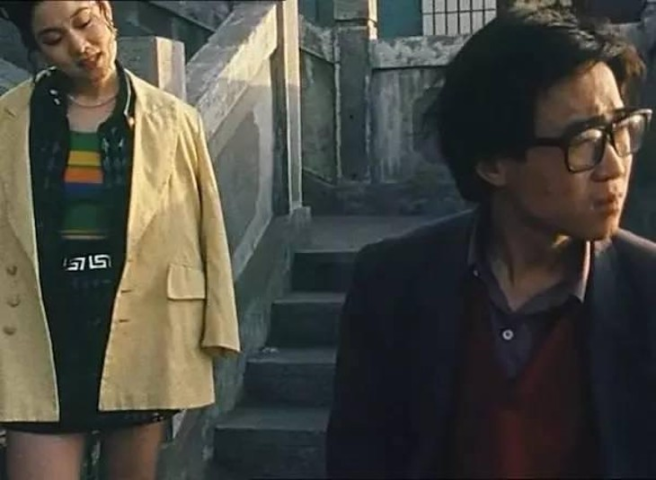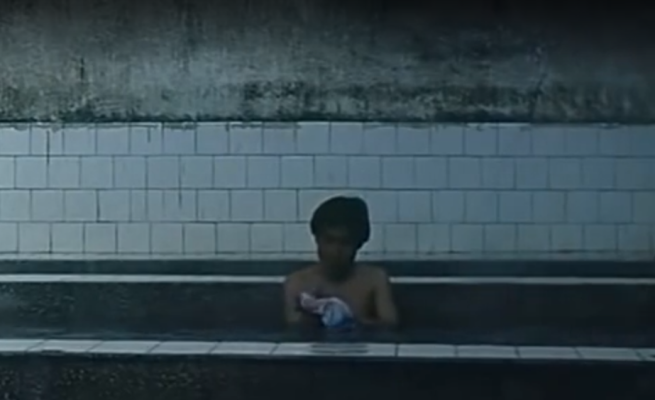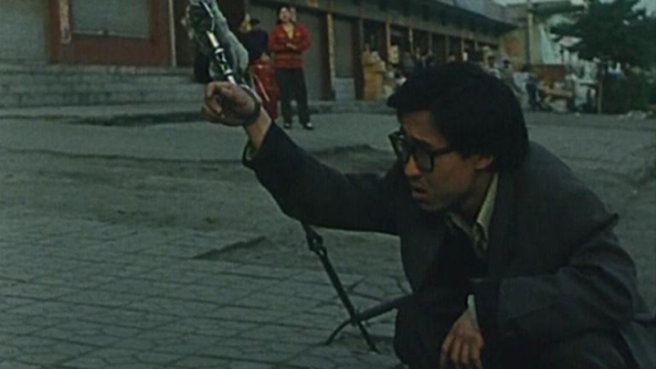I DON’T KNOW ABOUT YOU BUT I AM CRAZY EXCITED ABOUT CRAZY RICH ASIANS COMING OUT IN CINEMAS THIS SUMMER. SO CRAZY EXCITED IN FACT THAT I THOUGHT IT WOULD BE A NICE IDEA TO LOOK AT HOW THE PURSUIT OF WEALTH HAS BEEN PREVIOUSLY PORTRAYED IN FILM.
AND SINCE IT’S ME, I HAVE DECIDED TO LOOK AT TWO CHINESE FILMS: ZHOU XIAOWEN’s ERMO (1994) AND JIA ZHANGKE’s XIAO WU (1997). I 1000% RECOMMEND WATCHING THESE FILMS WHEN YOU HAVE A FREE SATURDAY EVENING AND A BARREL OF POPCORN HANDY.
800 WORDS
Source: Google Images
~~~~~~~~~~~~~~~~~~~~~~~~~~~~~~~~~~~~~~~~~~~~~~~~~~~~~~
“To get rich is glorious.”
Deng Xiaoping 邓小平 (1904 – 1997), 1992.
Deng’s perceived catchphrase, “To get rich is glorious” [致富光荣], unleashed a wave of personal entrepreneurship and pragmatism in the 1990s that continues to drive China’s economy today. This economic transformation is presented in Jia Zhangke’s 贾樟柯 (b.1970) Xiao Wu (Xiao Wu小武, 1997) and Zhou Xiaowen’s 周晓文 (b.1954) Ermo (Ermo二嫫, 1994).
What these films show is that whether you live in a rural village, like Ermo, or in a county-level city, like Xiao Wu, notions of gender and identity during this period were in flux. The onslaught of capitalist behaviours distorts traditional views of gender as women leave the domestic sphere and men retreat to it. By conducting a comparison of the character arch of the lead protagonists in Xiao Wu and Ermo, I will argue that getting rich is not glorious, but perplexing to not only notions of gender but also, of identity.
Background on Ermo and Xiao Wu
Zhou Xiaowen’s Ermo is set in a rural Chinese village on the fringes of modernisation during the 1990s. The main protagonist, Ermo (Ai Liya 艾丽娅), is a peasant woman who is determined to buy a twenty-nine-inch television to elevate her social status within the village. However, this pursuit for a television becomes a wider allegory for China’s pursuit of modernisation during the post-Mao period.
China’s economic transformation is also a dominant theme in Jia Zhangke’s Xiao Wu which is set in the rapidly commercialising county-level city of Fenyang (which is also Jia’s hometown). Amidst this swift modernisation, Xiao Wu (Wang Hongwei 王宏伟) is left behind. He scrapes a living from stealing while his friends move on to more straight-lace occupations.
While Xiao Wu has lost out, Ermo seems to take advantage of this new capitalist climate. Despite this, exhausted and confused, both Ermo and Xiao Wu eventually fall victim to China’s rampant capitalism.
Sexual Dominance
With Deng’s focus on economic reform, China opened its arms to the pursuit of monetary wealth. This pursuit of wealth was synonymous with a pursuit for power as money became a rubric of influence and control. Indeed, the power through owning and exchanging money is reminiscent of another form of human exchange: sex. Therefore, it is not surprising to observe how Ermo’s libido increases as she becomes more economically dominant.
As the breadwinner of the family, Ermo frequently exhibits masculine behaviours. She is often shown to leave the shared family bed at night to go outside to the courtyard to make noodles. The shots of Ermo’s rhythmic kneading of her feet on the noodle dough is reminiscent of male masturbation (Cieko and Lu 2002, p.95). The use of close-ups on Ermo’s perspiring face is particularly effective in showing the intense gratification she receives from massaging the dough and – on a metaphorical level – massaging her own ego (see Figure 1).

These close-ups also focus on Ermo’s feet and legs (see Figure 2.1 and Figure 2.2). While I agree with critic Xiaobing Tang that these series of shots of Ermo’s body parts highlights her pent-up libidinal energy, I believe that this analysis is not fully developed (Tang 2003, p.656). This series of shots also suggests that Ermo’s identity is fragmented: she is presented not as a full person, but as a series of limbs conducting actions. By including these repeated behaviours, Zhou Xiaowen suggests that Ermo is a literal money-making machine.


As Ermo’s libido and masculine behaviours increase with the accumulation of money, Xiao Wu’s masculine identity depletes. Xiao Wu’s girlfriend, Mei Mei, leaves him after finding out that the money he had given his friend, Xiaoyong, as a wedding gift was stolen: “dirty cash” [臭钱].
Whereas money ‘well-earned’ enables Ermo to satiate her sexual craving with an affair with her neighbour, money that has been stolen prevents Xiao Wu from continuing his relationship with Mei Mei and thus diluting his sexual dominance.
Claustrophobic Surroundings
As well as exerting sexual prowess, Xiao Wu also struggles to construct any concrete identity within this new commercialized society. For example, Xiao Wu, having stolen some ID cards, drops them off at the police station. It seems that Xiao Wu, uncertain of his own role in the world, ironically gives back identity to others but cannot find it for himself.
Although Xiao Wu attempts to adopt other identities, he is still trapped within his social environment. By positioning Xiao Wu at the edge of shots, Jia Zhangke creates a certain claustrophobia, suggesting that Xiao Wu is not only entrapped within the frame, but also within the confines of Fenyang (see Figure 3.1 and Figure 3.2). This type of framing is more frequently used when Xiao Wu is in public spaces. His discomfort to be out in public depicts what it is like to live in a Chinese city that is expeditiously changing.


Similarly, Ermo is comprised of a “series of claustrophobic places” thus creating a “sense of desperation” (Donald 2000, p.122). In contrast to Xiao Wu, Ermo is at her most confident when in public. She comes into her own when selling her twisted noodles on the side of the busy city street. The tightly framed shot is indeed claustrophobic as she is squeezed between a statue of a policeman and another hawker with her basket of wares in front of her (see Figure 4.1). Despite this, it is Ermo’s repeated cry, “Twisted noodles for sale!” [卖麻花面], that vividly shows how she is audibly dominant within the public space. This image of Ermo squatting behind her noodle basket becomes the film’s visual leitmotif and associates her role as a woman within the arena of commerce rather than with the home.

In contrast, Xiao Wu is as his most self-assured when he is alone and indoors (see Figure 4.2). At what thus becomes the climactic point of the film, Xiao Wu goes to the bathhouse to bathe in the success of having established his relationship with Mei Mei. Unfortunately, this scene is the last moment of respite before the film’s cruel denouement. Away from the eyes of the public, Xiao Wu visually relaxes as he submerges himself within the safety of the womb-like pool. Like Ermo, it is through audio that we understand that Xiao Wu is at his most contented as he starts to sing – an action that he was unwilling to do in the presence of Mei Mei. While the rise of commercialism in China enables Ermo to engage and participate in the public sphere, Xiao Wu retreats to the domestic sphere escaping from the pressures of the capitalistic climate.

Cruel Endings
However, the commercial environment of the 1990s prevents Ermo and Xiao Wu from cementing these new gender roles and identities. While Xiao Wu is at his most peaceful within the domestic sphere, it is in the public sphere that we see the last shot of him. During a government crack-down on theft, Xiao Wu is arrested for stealing; he is then chained up and publicly exhibited for all to see (see Figure 5.1).

Martin Scorsese notes that Wang Hongwei’s portrayal of Xiao Wu “is anything but sentimental” and makes the ending of the film “all the more devastating” as Xiao Wu is unceremoniously displayed for all to see (here for full article).
Ermo ends on a similar note – having finally installed the TV in her house, she sits beside it, vacant and exhausted, confined back in the private spehere (see Figure 5.2). Both literally and metaphorically chained, Xiao Wu and Ermo become spectacles.

In Sum…
The twenty-nine-inch television is the embodiment of Deng’s slogan “to get rich is glorious”. Yet, the staring, vacant-looking Ermo and Xiao Wu become an index of an ideological emptiness that was a result of the personal entrepreneurship and pragmatism of the post-Mao era.
Both films depict how the pressure to succeed in this new capitalist climate garbles traditional gender roles and thus, identity. The tired, dispirited Ermo cannot enjoy the fruits of her blind capitalistic pursuit of material objects; and Xiao Wu, confused and exposed, is left behind as post-Mao China hurries ahead in its pursuit of modernity: a pursuit of glory and riches.
References
Ciecko, A and Sheldon Lu 2002, “Ermo: Televisuality, Capital and the Global Village” in China, Transnational Visuality, Global Postmodernity, edited by Sheldon Lu, 89-103. Stanford University Press, California
Donald, S 2000, Public Secrets, Public Spaces: Cinema and Civility in China. Rowman & Littlefield, Maryland.
Ermo 二嫫. Directed by Zhou Xiaowen周晓文. Shanghai Film Studio and Hong Kong Ocean Film, 1994. Film.
Rayns, T 2000, “China/Hong Kong 1997,” BFI Film Forever, March 2, 2000, http://old.bfi.org.uk/sightandsound/review/586 (accessed April 10, 2018).
Tang, X 2003, “Rural Women and Social Change in New Chinese Cinema: From Li Shuangshuang to Ermo,” Positions vol. 11, no. 3, pp. 646-674.
Xiao Wu 小武. Directed by Jia Zhangke 贾樟柯. Hu Tong Communications, 1997. Film.




